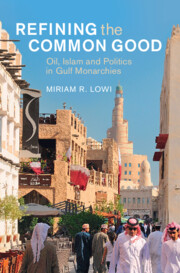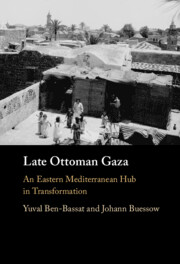6722 results in Middle East government, politics and policy
3 - The State and the Political Economy of Distribution
-
- Book:
- Refining the Common Good
- Published online:
- 08 November 2024
- Print publication:
- 21 November 2024, pp 47-73
-
- Chapter
- Export citation
4 - Society Responds
-
- Book:
- Refining the Common Good
- Published online:
- 08 November 2024
- Print publication:
- 21 November 2024, pp 74-87
-
- Chapter
- Export citation
Dedication
-
- Book:
- Refining the Common Good
- Published online:
- 08 November 2024
- Print publication:
- 21 November 2024, pp v-vi
-
- Chapter
- Export citation
3 - Relationships with the Rural Population
-
- Book:
- Late Ottoman Gaza
- Published online:
- 07 November 2024
- Print publication:
- 21 November 2024, pp 97-118
-
- Chapter
- Export citation
Appendix
-
- Book:
- Refining the Common Good
- Published online:
- 08 November 2024
- Print publication:
- 21 November 2024, pp 175-176
-
- Chapter
- Export citation
Note on Transliteration
-
- Book:
- Refining the Common Good
- Published online:
- 08 November 2024
- Print publication:
- 21 November 2024, pp xiv-xiv
-
- Chapter
- Export citation
Acknowledgments
-
- Book:
- Late Ottoman Gaza
- Published online:
- 07 November 2024
- Print publication:
- 21 November 2024, pp x-xi
-
- Chapter
- Export citation
2 - Living in Late Ottoman Gaza
-
- Book:
- Late Ottoman Gaza
- Published online:
- 07 November 2024
- Print publication:
- 21 November 2024, pp 65-96
-
- Chapter
- Export citation
7 - Islamic Banking and Finance
-
- Book:
- Refining the Common Good
- Published online:
- 08 November 2024
- Print publication:
- 21 November 2024, pp 140-166
-
- Chapter
- Export citation

Refining the Common Good
- Oil, Islam and Politics in Gulf Monarchies
-
- Published online:
- 08 November 2024
- Print publication:
- 21 November 2024

Late Ottoman Gaza
- An Eastern Mediterranean Hub in Transformation
-
- Published online:
- 07 November 2024
- Print publication:
- 21 November 2024
Postscript
-
- Book:
- Tunisian Politics in France
- Published online:
- 24 October 2024
- Print publication:
- 07 November 2024, pp 177-179
-
- Chapter
- Export citation
5 - Anti-Regime Struggles and Immigrant Politics
-
- Book:
- Tunisian Politics in France
- Published online:
- 24 October 2024
- Print publication:
- 07 November 2024, pp 111-140
-
- Chapter
- Export citation
Notes on Translation and Transliteration
-
- Book:
- Tunisian Politics in France
- Published online:
- 24 October 2024
- Print publication:
- 07 November 2024, pp viii-viii
-
- Chapter
- Export citation
3 - Constraints and Opportunities for Long-Distance Tunisian Activism
-
- Book:
- Tunisian Politics in France
- Published online:
- 24 October 2024
- Print publication:
- 07 November 2024, pp 49-80
-
- Chapter
- Export citation
Bibliography
-
- Book:
- Tunisian Politics in France
- Published online:
- 24 October 2024
- Print publication:
- 07 November 2024, pp 180-200
-
- Chapter
- Export citation
1 - Introduction
-
- Book:
- Tunisian Politics in France
- Published online:
- 24 October 2024
- Print publication:
- 07 November 2024, pp 1-25
-
- Chapter
- Export citation
Chronology of Key Events
-
- Book:
- Tunisian Politics in France
- Published online:
- 24 October 2024
- Print publication:
- 07 November 2024, pp ix-xiii
-
- Chapter
- Export citation
Contents
-
- Book:
- Tunisian Politics in France
- Published online:
- 24 October 2024
- Print publication:
- 07 November 2024, pp v-v
-
- Chapter
- Export citation
Abbreviations
-
- Book:
- Tunisian Politics in France
- Published online:
- 24 October 2024
- Print publication:
- 07 November 2024, pp xiv-xviii
-
- Chapter
- Export citation

